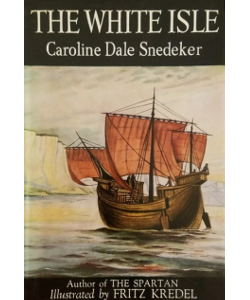The White Isle

Author:
Caroline Dale Snedeker
Illustrator:
Fritz Kredel ![]()
Publication:
1940 by Doubleday & Company, Inc
Genre:
Fiction, Historical Fiction
Pages:
271
Current state:
This book has been evaluated and information added. It has been read but content considerations may not be complete.
Book Guide
Search for this book used on:
The White Isle is Britain–a barbaric land ot the patrician Claudian family exiled from Hadrian's Rome, but an island of strange enchantment and stirring adventures to Lavinia, their daughter, whoes story Caroline Dale Snedeker tells in one of her finest books.
The story of Lavinia and her family, of their long, arduous and constantly exciting trip through Gaul to the farthest province of the empire, begins in Rome and comes to a romantic climax in the new home. It is one of the first books to bring to young people today a spirited picture of Roman life in Gaul and Britain.
Because Favonius, Lavinia's father, had been too much in sympathy witth the old Republic he had incurred the Emporor's disfavor, and was suddenly appointed legauts to far-away Britain. So after sad farewells and a suddenly cancelled wedding the whole family began their long journy along the Roman roads still famed roday.
Lavinia's new experiences and her romance with a British-born Roman, set in the days of early Christianity, combine to make a superb historical novel.
From the dust jacket
To view an example page please sign in.
To view reprints of this book please sign in.
Content Guide
Please sign in to access all of the topics associated with this book and view other books with the same topics.
Please sign in to access the locations this book takes place in and view other books in the same location.
Please sign in to access the time periods this book takes place in and view other books in the same time period.
For information about the lead characters please sign in.
Reviews

The White Isle by Caroline Snedeker
Reviewed by Sherry Early
I would recommend this book for middle school and high school readers–and adults. There is romance and danger, but it’s quite chaste, in accordance with Roman standards of the time. The book acknowledges slavery as a common part of life in the Roman Empire and in patrician households, but it shows how that slavery was not only taken for granted and accepted but also degrading and brutal for both slave and master.

The White Isle
This is unique, so far as I know. It is a story of a too-outspoken officer in Rome of the days of Hadrian, who was exiled,...
Find This Book
Search for this book used on:



